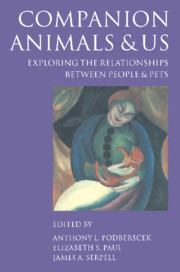Book contents
4 - Hunting and attachment to dogs in the Pre-Modern Period
from Part I - History and culture
Summary
INTRODUCTION
The phenomenon of dog-keeping in pre-modern societies raises challenging questions that have not yet received satisfactory attention in historical research (Menache, 1998). To mention but one crucial issue: was dog-keeping practicable among traditional societies, given the negative attitude towards dogs of all monotheistic religions? (Menache, 1997). This question becomes especially pertinent with regard to the Middle Ages in light of the ubiquitous presence of the Catholic Church and its widespread socio-political power. It is the premise of this chapter that dogkeeping resulted from the need of human beings to project onto their pets a variety of hopes and beliefs, needs and frustrations (Phineas, 1973–4; Perin, 1981; Thomas, 1984; Ronecker, 1994; Clutton-Brock, 1997). As a projection mechanism (Laplanche & Pontalis, 1984), dog-keeping may be considered a universal phenomenon; however, its character, scope and manifestations have been in a continuous state of change. In other words, the universal emotional basis of dog-keeping was not strong enough to make pets immune to the socio-economic, cultural and mental factors that dictated the nature and scope of pet-keeping in a given space and time.
Beginning with the wide-ranging subject of pet-keeping, this chapter goes on to examine the gradual evolution of dog-keeping in medieval Christendom, while focusing on the contribution of late medieval hunting to turning dogs into companion animals. Since hunting (with the help of dogs) was an important activity of the upper classes, it provided a leading factor in the evolution of dog-keeping, with all its affectionate connotations, among the medieval élite. This perspective will allow a brief discussion of the mental process that in the long run paved the way for dog-keeping in Western society. However, one should refrain from broad sociological/gender generalizations. In the particular context of pre-modern hunting and dog-keeping, it will be more accurate to speak in terms of the nobility and, more specifically, male groups. Although medieval women also participated in hunting, their participation was marginal, and we lack satisfactory evidence with regard to their approach to hunting and/or to the contribution of canines in the chase. This is not to say that women did not play an important part in dog-keeping – indeed, some archaeologists believe that it was women who began the domestication process (Zeuner, 1954; Clutton-Brock, 1987). Rather, gender should be taken into account when analysing the various factors that favoured affectionate attitudes towards dogs as companion animals.
- Type
- Chapter
- Information
- Companion Animals and UsExploring the relationships between people and pets, pp. 42 - 60Publisher: Cambridge University PressPrint publication year: 2000



